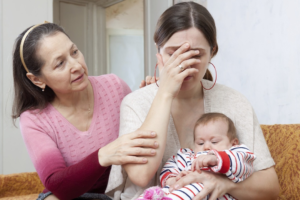
By Pooja Sharma, M.A., Psy.D., LMFT, Orange County Health Psychologists, Inc.
When new and expectant mothers share feelings of sadness, the response from well-meaning friends and family might be something like: “How can you be depressed if you’re having a baby?” or “But look how beautiful your baby is!”
Sadly, these seemingly uplifting and innocent comments often hurt. Despite everyone’s good intentions, what she really hears is: “Good mothers do not get depressed.”
The fact is, good mothers sometimes do experience depression. We just haven’t paid enough attention — and when we do, we often have misconceptions about what maternal and postpartum depression actually looks like.
While it is common to experience “baby blues” — a general sense of sadness within the first two weeks of giving birth — up to 20% of American women suffer from more serious health problems grouped together as Postpartum Mood and Anxiety Disorders, commonly referred to as postpartum depression (PPD).
Postpartum depression is not the same as baby blues. Although symptoms of postpartum depression can develop within the first four to six weeks after giving birth, sometimes the symptoms take several months to appear. PPD can affect all types of women regardless of ethnicity, race, age, or income level.
Symptoms of PPD include:
- Feelings of sadness
- Feeling overwhelmed
- Lack of interest in things you previously enjoyed
- Sleep disturbances
- Panic attacks, nervousness, and anxiety
- Excessive worry about baby
- Thoughts of harming yourself or your baby
- Fear that you cannot take care of your baby
- Feelings of guilt and inadequacy
- Irrational thinking
- Difficulty accepting motherhood
Most women do not experience all of these symptoms, but may notice some.
Although we don’t fully understand the causes of postpartum depression, certain factors such as a rapid change in hormone levels, genetic risk, and/or other biological processes might contribute to it. Social stressors, financial strain, violence, and/or a troubled relationship may contribute as well.
As a psychotherapist who treats women with postpartum depression, I always complete a comprehensive assessment for new and expecting mothers covering mental health, physical health, social strengths, and environmental strains. This information provides a good reference point to discuss many valuable local resources such hotlines, nutritional information, and self-care suggestions. Resources like these may help mothers reduce the stressors that contribute to postpartum depression. My approach is to strengthen families by helping them build the necessary skills to cope with and understand maternal health and depression.
Helpful links for Signs and Symptoms
US Health and Human Services Office of Women’s Health
Postpartum Psychosis
About Pooja Sharma, M.A., Psy.D., LMFT
 Dr. Sharma provides a holistic, integrative approach in healing to help clients achieve their personal goals. As an integrative therapist, she strives to promote healing through the prism of body, mind, and spirit, therefore looking at the whole person and considers all aspects of life that factor into one’s well-being and path to happiness.
Dr. Sharma provides a holistic, integrative approach in healing to help clients achieve their personal goals. As an integrative therapist, she strives to promote healing through the prism of body, mind, and spirit, therefore looking at the whole person and considers all aspects of life that factor into one’s well-being and path to happiness.
Schedule an Appointment
949.491.2430
sharma@OCHealthPsych.com
CA License # LMFT86722

